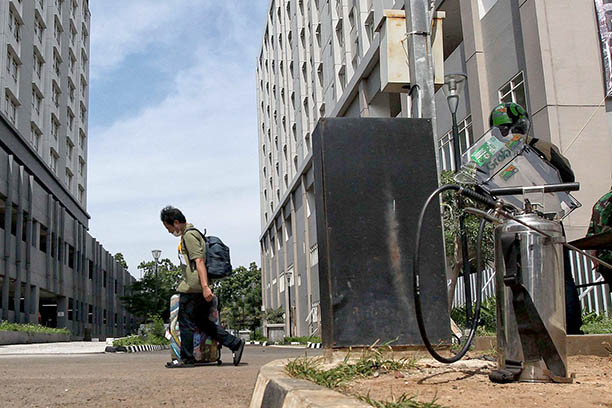Popular Reads
Top Results
Can't find what you're looking for?
View all search resultsPopular Reads
Top Results
Can't find what you're looking for?
View all search resultsA ‘wicked’ public policy problem or complacent public officials?
Some countries have chosen health; some have picked the economy.
Change text size
Gift Premium Articles
to Anyone
A
fter COVID-19 began to spread worldwide early this year, the novel health issue quickly transformed into a complex or “wicked” policy problem, dragooning governments into choosing between the health and the economic prosperity of citizens.
Some have chosen the former, but some have picked the latter. Months later, once a seemingly wicked policy problem, COVID-19 is now considerably under control, at least in some East Asia and ASEAN regions, as many governments in these regions have risked their economic growth to ensure the health of their populations first. In return, the first wave of COVID-19 has passed for these countries.
However, this is not the case for Indonesia. It is still seeing its positive cases going uphill – more than 324,600 cases and still counting. What are the possible explanations for this seemingly everlasting outbreak in Indonesia? For many, it is easy to blame the lack of public compliance with health protocols.
But is it really because of a lack of adherence to health protocols or is it actually the absence of reliable regulations and protocols which are, in fact, a byproduct of unreliable and irresponsible government?
After a series of intense criticisms targeting the Indonesian government for seeming incompetence in handling COVID-19, President Joko “Jokowi” Widodo finally made a light-shedding statement emphasizing the importance of health over the economy in the first week of September. Only a few days later, Jakarta Governor Anies Baswedan reinstated large-scale social restrictions (PSBB) in Jakarta.
Although the return of PSBB was applauded by many, some central government figures, including President Jokowi, expressed their disagreement. PSBB finally came into effect, but public trust in the government has dropped.
Drawing from this episode alone, one can find at least three explanations why the wickedness of COVID-19 in the country is difficult to tame. First, the government lacks good internal coordination, which often leads to contradicting and unreliable policies. The unnecessary political drama and tension among public officials has left many in society stranded without any direction.
Small and medium business owners, blue collar workers and many others are now on their own in the fight to survive this uncertainty, while the central government and regional administrations are passing the buck to each other.
Referring to M. Habib Abiyan Dzakwan of the Centre for Strategic and International Studies’ Disaster Management Research Unit, this is partly caused by ill-governed decentralization, where noteworthy approaches by regional governments are often underappreciated by the central government as the latter is bound by the intricacy of its own political bureaucracy.
Second, the Indonesian government is failing to allocate proper capital and human resources into its COVID-19 response. An everlasting cycle of creating new ad-hoc COVID-19 committees consisting of the same public officials shows it all. This indicates an underlying governmental incompetence in budgetary and organizational planning when it is faced with a novel state of emergency.
Finally, there are still many complacent public officials who make up the majority of the government leading to a series of complacent policies. The statements of Health Minister Terawan Agus Putranto and Coordinating Economic Minister Airlangga Hartanto regarding the current healthcare capacity in Indonesia, which were not based on real data, for example, have revealed the rotten “complacent employee” culture of the country’s public officials. Rather than showing facts, they prefer to act otherwise simply to please their superiors. This leads to a false sense of security, putting the entire population at risk.
There are many things the government can do to effectively pull the emergency brake on COVID-19. First, the central government must play a major part in the COVID-19 recovery by taking a firm stance that should be communicated to all layers of public officials and translated into a detailed range of actions. This would help the public understand the direction they must follow and improve their obedience to the regulations.
Second, the government should listen to relevant stakeholders such as doctors, epidemiologists and big data scientists in order to produce a fact-based and public-centered solution.
Finally, the government should begin adopting a more entrepreneurial culture that underscores the importance of measurable and responsible risk-taking behavior. This arguably will reduce unnecessary complacency on the part of public officials.
Policymakers should understand that COVID-19 is a complex problem that likely requires unpopular decisions to solve.
----
Master’s candidate in public policy at the Lee Kuan Yew School of Public Policy, National University of Singapore, on a Li Ka Shing Foundation scholarship.










